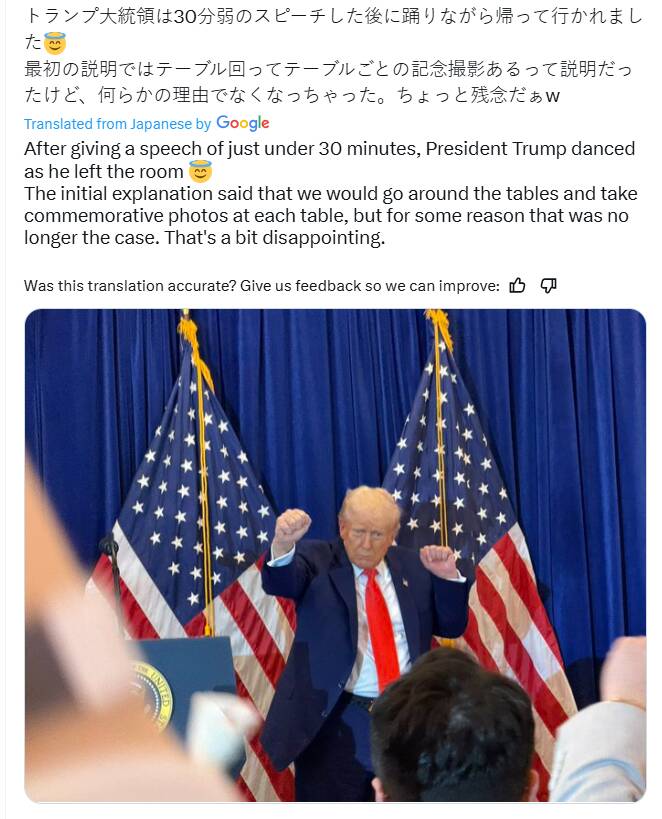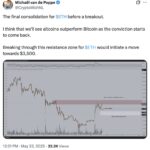In a high-profile gathering that has stirred both excitement and skepticism, the top 220 holders of former President Donald Trump’s memecoin convened at his golf course in Virginia for an exclusive dinner on May 21. With a staggering total of $148 million spent for an “ultra-exclusive VIP reception,” the event was seen as a unique opportunity for select attendees to discuss cryptocurrency policy directly with Trump. However, it also raised significant questions regarding potential foreign influence and corruption, especially since the White House Press Secretary declined to disclose the guest list, labeling the dinner a private affair.
Attendees included prominent figures from the cryptocurrency world, such as Justin Sun, the founder of Tron, who not only held the title of the largest TRUMP tokenholder but also received a special watch during the evening’s festivities. His attendance was particularly controversial due to ongoing legal challenges from the U.S. Securities and Exchange Commission relating to his past trading activities.
Others at the event included Kain Warwick, founder of the iFinex exchange, who expressed his desire to speak with Trump or his team about decentralized finance, a sector he felt was being overshadowed in current legislative discussions. He notably highlighted the slim odds of connecting with the president among the elite crowd.
Likewise, Vincent Liu, CIO of Kronos Research, emphasized the extraordinary chance attendees had to gain insights simply by holding the TRUMP token. This aligns with the broader sentiment in the crypto community that such gatherings could influence regulatory outcomes amidst a shifting legislative landscape in Washington.
The guest list featured a diverse mix of attendees, from athletes like two-time NBA champion Lamar Odom, who used the occasion to promote his own memecoin, to anonymous crypto traders whose identities remained hidden. Notably, Odom’s new project includes a unique staking mechanism that involves TRUMP holders, which adds another layer of complexity to the event’s dynamics.
Outside the venue, protests erupted, led by U.S. senators and former staffers who voiced their criticism of what they view as a troubling intersection of politics and the cryptocurrency industry. Their chants of “Shame!” pointed to growing concerns about the implications of political influence being bought and sold, with some lawmakers introducing anti-corruption bills aimed at curbing these practices.
This multifaceted event comes at a crucial moment for the cryptocurrency industry, which is actively advocating for more favorable regulations in Congress. However, Trump’s involvement and the attention surrounding the dinner may complicate the ongoing debates and negotiations surrounding cryptocurrency legislation in the United States.
Trump’s Memecoin Dinner: Key Points
The recent exclusive dinner at Donald Trump’s golf course for memecoin holders raises several important considerations:
- High-Profile Attendance:
- 220 top holders of Trump’s memecoin gathered, spending $148 million for a VIP reception with the president.
- Attendees included notable crypto executives like Justin Sun, Kain Warwick, and sports figures such as Lamar Odom.
- Access to Power:
- The event allowed foreign crypto executives unprecedented access to the U.S. President, raising concerns about corruption and foreign influence.
- Some attendees sought to discuss crypto regulation directly with Trump and his team, potentially swaying U.S. crypto policy.
- Lack of Transparency:
- White House Press Secretary declined to release a list of attendees, categorizing the affair as private and outside of presidential duties.
- This secrecy contributes to public skepticism regarding the link between political influence and wealth in the crypto space.
- Controversial Figures:
- Justin Sun, under legal scrutiny from the SEC for alleged manipulative trading, drew attention to the event’s integrity.
- Kain Warwick and others indicated they were motivated by discussions on decentralized finance, currently overshadowed in legislative efforts.
- Public Protests:
- Protests outside the venue highlighted the public’s concerns regarding the blending of politics and money, with calls for accountability on influence peddling.
- Senator Jeff Merkley and other critics emphasized that such events undermine the principle of government serving the people’s interests.
Impact on Readers:
These developments may affect readers’ perspectives on the intersection between politics and cryptocurrency, prompting caution about the implications of wealth in shaping policy. Vigilance regarding transparency and accountability can influence how individuals engage with both political and financial systems.
Exclusive Dinner at Trump’s Golf Course Sparks Controversy Among Crypto Elite
The recent gathering of the top holders of Donald Trump’s memecoin at his Virginia golf course has undoubtedly created a buzz, both in favor and against the current state of cryptocurrency regulation. While insiders see this as a unique opportunity to connect directly with the former president and influential political figures, critics raise valid concerns around the implications of such meetings for transparency in governance and the influence of foreign entities. This event uniquely positioned itself as a platform not only for networking but also for discussing the future direction of crypto legislation in the United States.
Competitive Advantages: Attendees were given a golden ticket to mingle directly with key political players, enhancing their visibility and potential influence in future crypto policy. High-profile participants, like Justin Sun and Kain Warwick, leveraged this forum to promote their projects, creating a narrative that the crypto space is intertwined with influential political connections. Sun’s advantageous position as the largest TRUMP token holder exemplifies how financial backing can translate to unique access, inviting speculation on whether similar strategies could successfully engage other lawmakers. This private dinner turned networking event could open doors for constructive dialogue around decentralized finance and regulatory practices, critical in shaping future legislative frameworks.
Competitive Disadvantages: Yet, the event also presents a glittering facade that critiques surfacing negative connotations of favoritism and potential corruption. The absence of a published attendee list has raised eyebrows, leading to accusations of elitism and cloistered discussions far removed from public scrutiny. Critics contend that this exclusive gathering could worsen the perception of insularity within crypto circles, exacerbating the divide between everyday investors and the elite few who can afford such privileged access. Furthermore, the presence of foreign crypto executives during a politically sensitive time warrants scrutiny, hinting at deeper implications related to foreign influence in domestic policy, especially as Congress approaches regulatory reforms.
This complex landscape means that while high-ranking crypto investors and influencers may significantly benefit from the increased visibility and potential regulatory discussions, they risk backlash from both the public and lawmakers focused on anti-corruption measures. Politicians and governance advocates might seize this moment to critique what they perceive as unethical entanglements between cryptocurrencies and political influence, leading to potential legislative challenges that could hinder progress in the industry. The event may serve as a lightning rod for protests, igniting further scrutiny into the relationships fostered within the temple of political power.

















